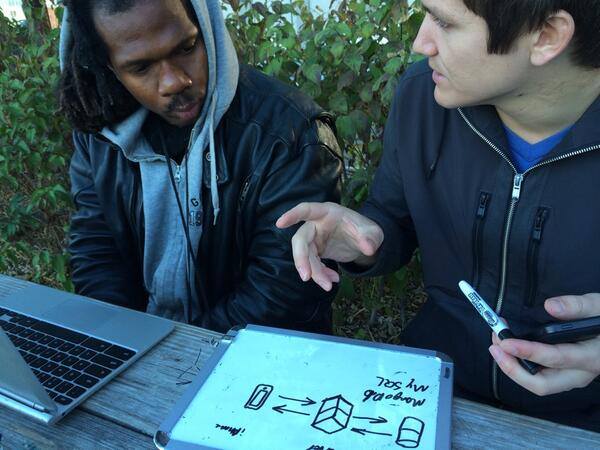When Patrick McConlogue announced his intention to teach a homeless man to code, the Internet unleashed its wrath.
People called him arrogant, “a 21st century asshole,” and criticized him for turning a homeless man into a “startup experiment” and weaving an “imaginary entrepreneurial novella.”
Now about three months later, Leo “Journeyman” Grand released a mobile app called “Trees for Cars.” It is available on iOS and Android for a buck, and Grand gets 70 cents for every download. The hope is that enough people will download the app that Grand will be able to afford a home, find a job, and/or pay for school.
“Every line of code was written for you by Leo Grand; all of the profits go to him,” McConlogue said on Grand’s Facebook page. “This is his story and his triumph […] If there was ever a time to mobilize for us here in this community, it is by sharing this app and asking people to purchase it.”
McConlogue is a 23-year-old software engineer. He wrote a post on blogging platform Medium in August titled “Finding the unjustly homeless and teaching them to code.”
“Every day walking to work in New York City, you will see the homeless. Some mentally gone, some drunk, some just making a wage begging,” McConlogue wrote. “However, I like to think I can see the few times when it’s a wayward puzzle piece. It’s that feeling you get when you know the waiter, the cashier, the janitor is in the wrong place—they are smart, brilliant even. This is my attempt to fix one of those lost pieces.”
McConlogue offered Grand two options — $100 in cash, or three JavaScript books, a basic laptop, and personal tutoring.
Grand chose to code.
Related: A tech Cinderella story: How Silicon Valley helped this homeless teen go to college
He spent the next few months learning about functions and variables in JavaScript, signed up for Github, and started developing an app.
Grand was an employee at MetLife but got laid off in 2011 and had to move out of his apartment and onto the streets. In a followup blog post, McConlogue called Grand “smart, logical, and articulate” and “a genius.” The two of them worked closely together, attracting a significant amount of media attention and amassing a following of nearly 48,000 people on Facebook.
Then in October, Grand was arrested for sleeping on a park bench in a park closed to the public. McConlogue called on his social network to rally support and Grand was released in time to make an appearance on the Today Show.
McConlogue then asked his boss at Noodle Education if he could stop his development work on Noodle.org to help Leo finish the app “and hopefully get him out before the snow.” They worked in Noodle’s offices for four weeks, working up to 10 hour days and on weekends, and were featured on CNN.
Both Grand and McConlogue proved skeptics wrong with their commitment and dedication. McConlogue demonstrated that this wasn’t just an attention-grabbing and naive lark, and he genuinely seems to have Grand’s best interest at heart. Grand wrote more than 3,000 lines of code and exhibited his powerful work ethic and desire to learn.
The culmination of these efforts is Trees for Cars — a mobile carpooling app that connects drivers and riders. Certainly there are bigger, established players out there in the same space (RelayRides, Lyft, Zimride, SideCar, Getaround, Ridejoy, etc.), but getting people to use the app doesn’t seem to be as much a priority as getting people to pay to download it.
It is definitely not a long-term solution, but one that McConlogue and Grand hope will at least offer a bridge to more opportunities.
Some of the criticism directed at McConlogue was for not going far enough to address homelessness. Homelessness is a serious issue in this country — the Associated Press found that four out of five U.S. adults struggle with joblessness, live near the poverty line, or are on welfare for at least a part of their lives. Once you get in the cycle of homelessness, it is hard to break out.
We earlier wrote an article about Ashana Davenport, a homeless teen whose former mentor essentially rescued her from the streets, helped her finish high school, and get into (and fund) college.
Critics sitting behind their computers like to say that these people are arrogant for wanting to help, and their efforts are futile since there are millions more people struggling with the same problems. But individual acts of kindness can be just as powerful and are just as important as organized, institutional efforts. McConlogue still did more than many others, and in a much more direct way.
And this experience inspired McConlogue to expand the effort, and he called for software engineers who are willing to teach students how to code. Ultimately, he wants to organize the sessions into a video database where people can learn for free.
Certainly, there is a need for widespread serious efforts that combat homelessness, and certainly after all this work and hype and hope, it would be tragic if Grand remains on the streets. But all in all, the release of Trees for Cars is a major milestone in what I believe to be an inspiring story, and a reminder that we all have the power to help those in need.
VentureBeat's mission is to be a digital town square for technical decision-makers to gain knowledge about transformative enterprise technology and transact. Learn More

